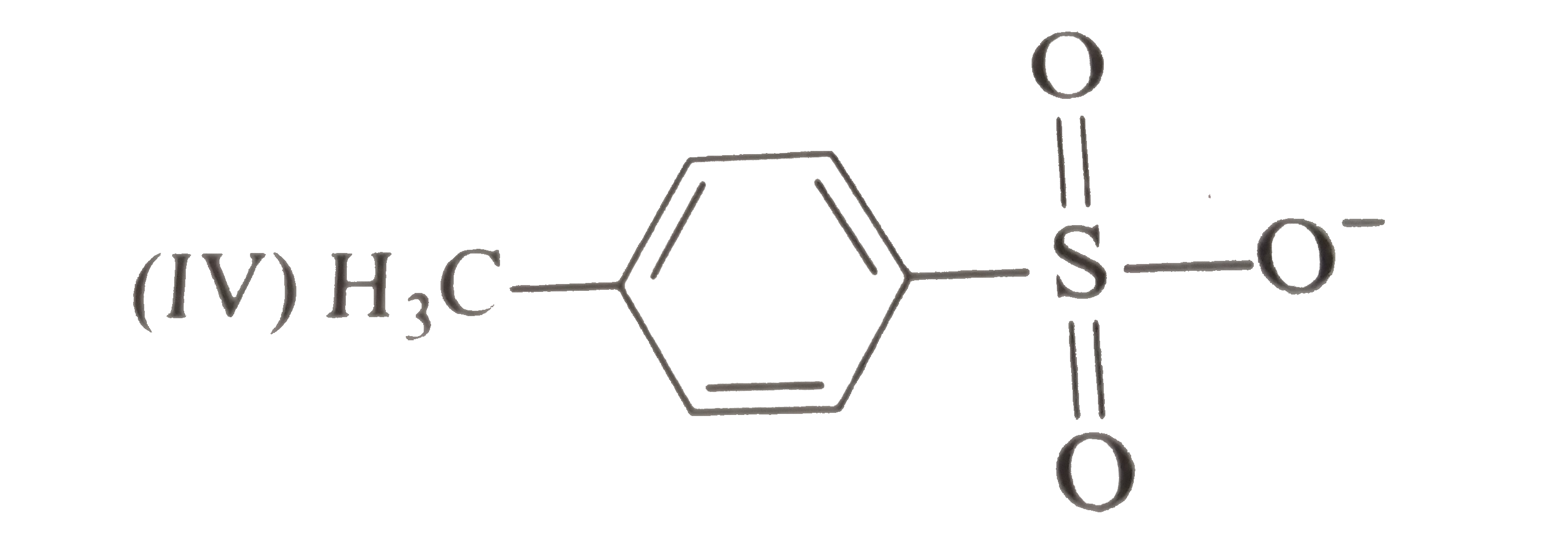The nucleophilicities of CH−3,NH−2,OH− and F− decrease in which order ?
CH−3>NH−2>OH−>F−
OH−>NH−2>CH−3>F−
NH−2>OH−>CH−3>F−
CH−3>OH−>F−>NH−2
The correct Answer is:A
To determine the order of nucleophilicity for the species CH−3, NH−2, OH−, and F−, we need to analyze the stability of the negative charges on each of these species and their ability to donate electrons.
Step 1: Understand Nucleophilicity
Nucleophilicity refers to the ability of a species to donate a pair of electrons. A stronger nucleophile is one that can more readily donate its electrons.
Hint: Consider the factors that influence nucleophilicity, such as charge, electronegativity, and the stability of the negative charge.
Step 2: Analyze Each Species
1. CH−3: The negative charge is on carbon, which is less electronegative than nitrogen, oxygen, and fluorine. This makes CH−3 a strong nucleophile because carbon can easily donate its electron pair.
2. NH−2: The negative charge is on nitrogen, which is more electronegative than carbon but less than oxygen and fluorine. Nitrogen can also donate its electron pair effectively, making it a good nucleophile, but not as strong as CH−3.
3. OH−: The negative charge is on oxygen, which is more electronegative than both carbon and nitrogen. Although OH− can donate electrons, its higher electronegativity means it holds onto its electrons more tightly compared to CH−3 and NH−2.
4. F−: The negative charge is on fluorine, which is the most electronegative element. This means F− holds onto its electrons very tightly, making it the weakest nucleophile among the four.
Hint: Compare the electronegativities of the atoms involved to understand how they affect the stability of the negative charge.
Step 3: Determine the Order of Nucleophilicity
Based on the analysis:
- CH−3 is the strongest nucleophile because it has the least electronegative atom holding the negative charge.
- NH−2 follows as it is less stable than OH− but more stable than CH−3.
- OH− is next due to the higher electronegativity of oxygen.
- F− is the weakest nucleophile because fluorine holds onto its electrons the most tightly.
Thus, the order of nucleophilicity is:
CH−3>NH−2>OH−>F−
Final Answer
The nucleophilicities of CH−3, NH−2, OH−, and F− decrease in the order:
CH−3>NH−2>OH−>F−
Nucleophilicity refers to the ability of a species to donate a pair of electrons. A stronger nucleophile is one that can more readily donate its electrons.
1. CH−3: The negative charge is on carbon, which is less electronegative than nitrogen, oxygen, and fluorine. This makes CH−3 a strong nucleophile because carbon can easily donate its electron pair.
2. NH−2: The negative charge is on nitrogen, which is more electronegative than carbon but less than oxygen and fluorine. Nitrogen can also donate its electron pair effectively, making it a good nucleophile, but not as strong as CH−3.
Based on the analysis:
- CH−3 is the strongest nucleophile because it has the least electronegative atom holding the negative charge.
- NH−2 follows as it is less stable than OH− but more stable than CH−3.
- OH− is next due to the higher electronegativity of oxygen.
- F− is the weakest nucleophile because fluorine holds onto its electrons the most tightly.
CH−3>NH−2>OH−>F−
The nucleophilicities of CH−3, NH−2, OH−, and F− decrease in the order:
CH−3>NH−2>OH−>F−
Topper's Solved these Questions
- HALIDESBook:HIMANSHU PANDEYChapter:HALIDESExercise:Level 1 (Q.26 To Q.48)
Explore 23 Videos
- HALIDESBook:HIMANSHU PANDEYChapter:HALIDESExercise:Level 2 (Q.1 To Q.25)
Explore 25 Videos
- GENERAL ORGANIC CHEMISTRYBook:HIMANSHU PANDEYChapter:GENERAL ORGANIC CHEMISTRYExercise:Subjective Type Problems
Explore 19 Videos
- ISOMERISMBook:HIMANSHU PANDEYChapter:ISOMERISMExercise:Subjective Type Problems
Explore 11 Videos
Similar Questions
Arrange the following
(i) −CHO,−COCH3,−COOH,−COCl,−CONH2,−COOCH3,−COO− in dereasing order of nucleophilic addition.
(ii) CH3CHO,CH3COCH3,HCHO,C2H5COCH3 in decreasing order of nucleophilic addition.
(iii)CH3COCH2CHO,CH3COCH3,CH3CHO,CH3COCH2COCH3 in increasing order of expected enol content.
(iv) CH3CHO,C6H5CHO,(CH3)CO,FCH2CHO in decreasing order of reactivity

in decreasing order of reactivity
View SolutionArrange the following in increasing base strength
CH−3,NH+2,OH−,F−
View Solution
Knowledge Check
Arrang the anions (p) −CH3,(q)−NH2,(r)OH−,(s)F−, in decreasing order of their basic strength .
Ap>q>r>sBq>p>r>sCr>q>p>sDr>p>q>sWhat is the decreasing order of strength of the bases OH−,NH−2,HC≡C−andCH3CH−2?
ACH3CH−2>NH−2>HC≡C−>OH−BHC≡C−>CH3CH−2>NH−2>OH−COH−>NH−2>HC≡C−>CH3CH−2DNH−2>HC≡C−>OH−>CH3CH−2The decreasing order of nucleophilicity among the nucleophiles is :
(I) CH3−C∣∣O−O−
(II)CH3O−
(III) CN− (IV) A(C),(B),(A),(D)B(B),(C),(A),(D)C(D),(C),(B),(A)D(A),(B),(C),(D)
A(C),(B),(A),(D)B(B),(C),(A),(D)C(D),(C),(B),(A)D(A),(B),(C),(D)
Amongst OH−,CH3COO− and CH3O− ions, nucleophilicity decreases in the order.................. .
View SolutionArrange H2O,NH3andCH4 in the decreasing order of bond angle.
View SolutionArrange the following in order of their
(i) Increasing basicity
H2O,OH−,CH3OH,CH3O−
(ii) Increasing reactivity in nucleophilic substitution reactions
CH3F,CH3l,CH3Br,CH3Cl
View Solution(i) Arrange the following in order of their increasing boling point.
H2O,OH−,CH3OH,CH3O−
(ii) Arrange the following in order of their increasing boiling point :
n-butane, ethanol, water, propane.
(iii) Arrange the following in order of their increasing boiling point :
n-butan, n-butanol,n-butyl chloride,isobutane.
(iv) Arrange the primary, secondary and tertiary alcohols into decreasing order of reactivity towards sodium.
(v) Arrange the primary, secondary and tertiary alcohols into decreasing order of acidity .
(vi) Arrange the following in order of their decreasing boiling point :
pentan-1-ol,2-methyl butan-2-ol,3-methyl butan-2-ol.
(vii) Arrange the following in decreasing order of rate of dehydration with conc. H2SO2:
CH3CH2CH(OH)CH2CH2CH3(A)
(CH3)2C(OH)CH2CH2CH3(B)
(CH3)2C(OH)CH(CH3)2(C)
CH3CH2CH(OH)CH(CH3)2(D)
CH3CH2CH2CH2CH2CH2CH2(E)
View SolutionWhat is the correct order of decreasing nucleophilicity in non-polar solvents: OH−,NH−2,F−,CH−3
View Solution

